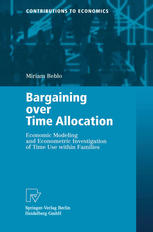

Most ebook files are in PDF format, so you can easily read them using various software such as Foxit Reader or directly on the Google Chrome browser.
Some ebook files are released by publishers in other formats such as .awz, .mobi, .epub, .fb2, etc. You may need to install specific software to read these formats on mobile/PC, such as Calibre.
Please read the tutorial at this link: https://ebookbell.com/faq
We offer FREE conversion to the popular formats you request; however, this may take some time. Therefore, right after payment, please email us, and we will try to provide the service as quickly as possible.
For some exceptional file formats or broken links (if any), please refrain from opening any disputes. Instead, email us first, and we will try to assist within a maximum of 6 hours.
EbookBell Team

4.8
44 reviewsIn this book, time use behavior within households is modeled as the outcome of a bargaining process between family members who bargain over household resource allocation and the intrafamily distribution of welfare. In view of trends such as rising female employment along with falling fertility rates and increasing divorce rates, a strategic aspect of female employment is analyzed in a dynamic family bargaining framework. The division of housework between spouses and the observed leisure differential between women and men are investigated within non-cooperative bargaining settings. The models developed are tested empirically using data from the German Socio-Economic Panel and the German Time Budget Survey.